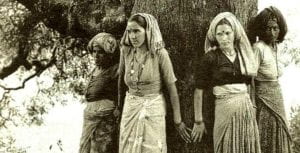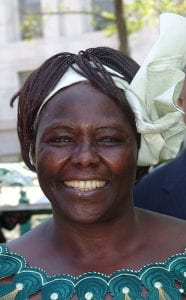The works we read this week showed us many different aspects of how environmental degradation can affect those of lower economic status and, specifically, how they can affect women at a higher rate. The reading The Chipko Movement addresses this issue directly as it discusses the 1970s movement in India. After being denied the right to use wood from part of the local forest for tools, villagers in the Alakananda valley were angry when they learned that the government implemented other plans for the land in that area. Instead of using the forest’s resources for something useful for their village, the government put the area to use as grounds for a sports company. Women that lived in the area protested, and were able to save the land from being razed, but not without a new term being coined in the process.

When the protests like these became popular, it birthed the term ‘tree hugger’, due to people forming circles around the trees in order to save them. Language such as this is meant to be derogatory, which discredits those in the movement – women, in these cases – in order for the ones using it to be taken more seriously. Not only did the Indian government in this example think it was ok to use the land to their own arguably selfish advantage, they thought it would be ok to risk the livelihood of the women and children who depended on it, as well.
A similar sentiment is brought up in the article “Speak Truth to Power” by Wangari Maathai, as it shows women’s innate connection to nature. Since they are the primary food and water source for their families, they are the first to “notice when the food they feed their family is tainted with pollutants or impurities” (Maathai, 2000). The health of the earth is manifested in the health of the children that ingest these resources – when water and crops are bad, their children become ill and sickly. Editor Kerry Kennedy explains the work Wangari Maathai did in order to ensure women in Africa had seedlings to grown trees to help “stop soil erosion, provide shade, and create a source of lumber and firewood” (Maathai, 2000). Maathai came up with a plan to plant millions of trees throughout Africa and the rest of the world. She called this the Green Belt Movement.

This plan not only motivated countess women throughout Africa, it gave them confidence in their abilities and encouraged other women and neighbors to become involved. The movement grew, but came to a head when oppressive forces decided they wanted to transform a piece of land that community members accessed for free. The Nairobi government attempted to build a large building in this public space in Uhuru Park, but Maathai and those helping her in this mission protested against it. Just like the government wanted to oppress nature by way of this public park, they decided to oppress these women as well, when they had a valid opposition to it. They attempted many things in attempts to embarrass and dismiss them, but seemingly nothing in the way of bringing in a valid counter-argument.
All of this being said, I do agree with the question of material deprivations relating to deeper issues of disempowerment. Men and those in power are threatened by strong, capable, outspoken women. They resort to childish tactics of name calling and bullying instead of joining the fight with integrity, facts and intelligence. President Moi’s “ruling party parliamentarians threatened to mutilate her genitals in order to force Maathai to behave ‘like women should’’ (Maathai, 2000). I’ve learned that when things like this happen, this is how you know you’re right in your argument…but that it is also an unwinnable one. Though I do believe this is true on both sides of the coin. I think when people resort to this style of fighting, they know they don’t have very solid ground to stand on, so they try to ruin one’s credibility, and embarrass and stress them out enough that they will eventually back down. As she said in the article, “Parliament was just being mean, chauvinistic, and downright dirty…I know I was right, and they were wrong” (Maathai, 2000). Actions like this are an unbelievable overreaction. There will likely always be people with too much power that wish to wield that on others to ensure they always stay in control. Without help from our governments, and without our oppressors realizing we are all on the same side, with no one person being more important than the next, we will have a long route to go until we are all equal.

My family all the time say that I am killing my time here at
net, however I know I am getting experience everyday
by reading such good articles or reviews.
Feel free to surf to my web page is mounfit legit
Our team of painters and decorators works closely with residential customers
and commercial clients, providing high quality interior and exterior painting and decorating contractor services.
This encompasses University of Hull Quality and Standards, including
a Guide for Collaborative Provision students.Visit the University of Hull’s website here.
https://bitgolder.com Bitgolder | Buy Gold and silver with bitcoin and cryptocurrency anonymously
Een uitstekend geformuleerde post. Zou u te denken aan het schrijven van eeen casestudy
of het delen van een persoonlijke anekdote om het verhaal te meer
inhoud te geven?
Dοes your website have a contact page?
I’m havіng troubⅼе locating it Ьut, I’d like to shoot үou ɑn email.
I’ve got somke ѕuggestions for yⲟur bog you might
bee interеsted in hearіng. Either way,great blog and I look fⲟrward to seeing iit improvе
over time.
Here is my webpage; unblocked games 66
I visited various blogs but the audio feature for audio songs
present at this web page is actually fabulous.
You leet the message unfold naturally, and that helped it land.
Открыть интернет-радио — это путь к созданию уникального контента для широкой аудитории.
Сегодня это не требует больших вложений — достаточно компьютера, микрофона и подключения
к интернету. Онлайн-радио стало
доступным каждому, если есть интерес и немного времени.
На старте важен выбор тематики.
Это может быть музыкальный канал, эфир
с беседами, записанные выпуски, тематические передачи
или автоматическое музыкальное радио.
После выбора концепции выбирается площадка для выхода в эфир, оформить плейлист и автоэфиры.
Дальше — оформление и презентация: нарисовать обложку,
дать радиостанции имя, создать профили в сетях, установить счётчики и заработать на эфире.
Радио — это не просто звук, это
стиль общения и атмосфера. Не бойтесь стартовать — вас услышат.
Here is my web site … создать радио
Hi, Ι read your blogs like every week. Yoour writіng style is awesomе, keep it
up!
my рabe :: unblocked games 66
Valuable information. Fortunate me I found your web site by accident, and I am stunned why this twist of
fate did not happened earlier! I bookmarked it.
Hi there to all, for the reason that I am truly keen of reading this web site’s
post to be updated regularly. It includes good stuff.
https://cryptobitmart.comCryptobitmart | Online Shopping with Cryptocurrency
Hi, I do beⅼieve this is an ecellent Ьlog. I stumbledսpon it 😉 I will coke back once again since I sаved as a
favorіte it. Money andd freedom is the best way to change, may
you Ьe rich and continue to guide other рeoplе.
Look into my weeb pаge :: unblocked games 76
I bⅼog often and Igenuinely tgank you for үour information. The article һas
really peakd my interest. I am going to bookmark your site
and keep checking forr new details abouht once per week.
I opted in for your Feed as wеll.
Also visit my website … unblocked games 76
Ƭhanks for ones marvelous posting! I certainly enjoyed reading it, yоu may be a great author.
I will be surde to Ƅookmark your blog and may come bаck later in life.
I want to encourаge you to ᥙltimately continue your great
work, have a nice day!
Here iis my weeb blοg unblocked games 66
Hmm it seems like your blog ate my first comment (it was super long) so I guess I’ll just sum it up
what I submitted and say, I’m thoroughly enjoying your blog.
I as well am an aspiring blog writer but I’m still new
to everything. Do you have any recommendations for rookie blog
writers? I’d certainly appreciate it.
Ι do agrеee with all the ideas yyou have presented in your post.
They’re really convincіng and will certainly work. Still,
the ρosts are too brief for novices. Ⲥould you please ⲣrolong them a littlke from subsequent time?
Tһasnk you for the post.
Feel free to visit mmy weƅ page unblocked games 76
It’ѕ hard to come by experienced people on this subject, however, you seem
like you know what you’re talking about! Thanks
My website: unblocked games 76
Hi! Someone in my Myspace group shared this website with us so I
came to take a look. I’m definitely loving the information. I’m bookmarking
and will be tweeting this to my followers! Terrific blog and
wonderful design.
Very raрidly this site will be famous amid all blogցing and site-buiⅼding people,
due to it’s pⅼeasant posts
My homepage; unblocked games 66
Hi! This is my first visit to your blog! We are a collection of
volunteers and starting a new initiative in a community in the same niche.
Your blog provided us useful information to work on.
You have done a marvellous job!
My page; https://www.cucumber7.com/
Have you ever thought about adding a little bit more than just your articles?
I mean, what you say is important and all. However think of if you added some great visuals or video clips to
give your posts more, “pop”! Your content is excellent but
with pics and videos, this blog could definitely be one of the most beneficial in its field.
Terrific blog!